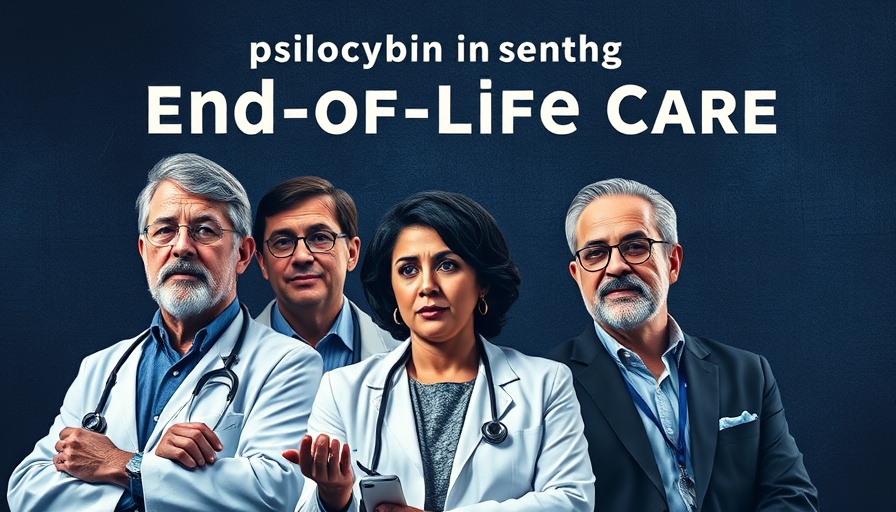
Rethinking Palliative Care: A Vital Need for Change
Palliative care is often misconstrued as synonymous with end-of-life care, which has led to significant misunderstandings about its true purpose. In the recent discussion presented in Palliative Care Needs a Rebrand | with BJ Miller, M.D. & Bridget Sumer, L.C.S.W., key insights are shared about how this vital healthcare service can be redefined to better serve those who need it. The emphasis shifts from a narrow focus on terminal stages of life to a broader vision that encompasses quality of life improvements for individuals facing chronic illness.
In Palliative Care Needs a Rebrand | with BJ Miller, M.D. & Bridget Sumer, L.C.S.W., key insights about transforming the narrative surrounding palliative care prompt our exploration of its vital importance in enhancing overall quality of life.
The Core of Palliative Care: Beyond Terminal Illness
Traditional views of palliative care focus on its applicability only when individuals are nearing the end of life, essentially sidelining its potential benefits for anyone with serious health conditions. Miller and Sumer advocate for a new narrative—one that highlights palliative care as a holistic approach to treatment that emphasizes symptom management, emotional support, and comprehensive quality of life improvements. This approach is akin to health and wellness strategies that prioritize mental health support and holistic wellness, resonating with the principles of a balanced diet plan and self-care practices.
Connecting the Dots: Wellness and Palliative Care
The conversation on palliative care aligns closely with broader themes of wellness and healthy lifestyle habits. Just as we might rely on immune system boosters and healthy eating habits to improve our physical health, palliative care practitioners strive to enhance the quality of life for their patients through targeted support. Miller emphasizes that people suffering from chronic diseases deserve to live fully and receive care that respects their dignity and preferences, which can be achieved through a wellness-focused model.
What This Means for Patients: A Right to Quality Life
For many patients, understanding that palliative care is not solely for those in their last phases of life can be liberating. It offers a platform for proactive healthcare decisions, allowing patients to be engaged in their treatment choices. This shift in perception holds major implications for fostering better communication between patients and healthcare providers. Many might initially associate palliative care with anxiety and fear, but when viewed through the lens of overall wellness, it becomes a tool for empowerment and informed decision-making.
A Call to Health Professionals: Embrace the Change
Health professionals and caregivers play a crucial role in facilitating this rebranding of palliative care. Training programs must incorporate principles of holistic health coaching to prepare workers for these nuanced conversations. The idea is not merely to inform but to integrate these practices into existing healthcare systems, paralleling natural health tips and wellness rituals that could transform patient interactions. Fostering an environment of openness around palliative care can help integrate it into discussions about chronic illness and mental well-being.
Bridging Perspectives: Community and Support
As we strive to redefine palliative care, it’s essential to consider the communal aspects of health and wellness. Community support can enhance mental clarity and boost resilience in individuals facing severe health challenges. Bridging the gap between healthcare provision and community involvement not only limits the stigma surrounding palliative care but also cultivates a more supportive atmosphere for patients. Strategies for stress relief and resilience-building can be vital, echoing the importance of strong social connections.
Taking Action: The Path Forward
The message conveyed in Palliative Care Needs a Rebrand transcends mere discussion; it encourages actionable insights for both patients and healthcare providers. For individuals, understanding palliative care as a means of enhancing life-quality prompts proactive engagement with their health. For providers, the call to action is to foster a balanced wellness lifestyle integrated with the concept of palliative care. This approach not only validates patients' experiences but also promotes holistic healing.
Conclusion: A Holistic Approach to Healing
To truly embrace this rebranding of palliative care, both patients and professionals need to advocate for systems that respect and prioritize comprehensive wellbeing. Whether through a focus on mental health support or engaging in practices that promote physical health, the future of palliative care depends on recognizing its value beyond the confines of end-of-life scenarios. As we embrace these ideas, we can ensure that every person receives the care and dignity they deserve, turning palliative care into a beacon of hope and support.
 Add Row
Add Row  Add
Add 




 Add Row
Add Row  Add
Add 


Write A Comment